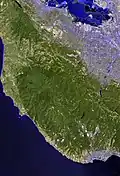| Wine region | |
| Type | American Viticultural Area |
|---|---|
| Year established | 1981[1] |
| Country | United States |
| Part of | California |
| Sub-regions | Ben Lomond Mountain AVA |
| Total area | app. 322,000 acres |
| Size of planted vineyards | 1,500 acres (6 km2)[2] |
| Grapes produced | Cabernet Franc, Cabernet Sauvignon, Carignane, Chardonnay, Dolcetto, Grenache, Malbec, Malvasia, Merlot, Mondeuse, Mourvedre, Nebbiolo, Petit Verdot, Petite Sirah, Pinot noir, Sangiovese, Sauvignon blanc, Syrah, Viognier, Zinfandel[2] |
| No. of wineries | 76[2] |
The Santa Cruz Mountains AVA is an American Viticultural Area centered on the Santa Cruz Mountains. Its territory spans three California counties, Santa Clara, Santa Cruz and San Mateo. Established in 1981 by the Alcohol and Tobacco Tax and Trade Bureau (TTB), Santa Cruz Mountains AVA was among the first to be defined by its mountain topography. Based on elevation, it largely follows the fog line along the coast, extending down to 800 feet (240 m) on the eastern slope toward San Francisco Bay, 400 feet (120 m) on the western slope to the Pacific Ocean and extending toward the ridgecrests at 3000+ feet elevation.[2]
The mountainous terrain, the Pacific Ocean, and the nearby San Francisco Bay have wide-ranging effects on the appellation, creating myriad microclimates in the region - depending on the elevation of the land, on which side of the mountains are the vineyards, the effects of fog, sun exposure, soil type, etc.
Geography
The region is bounded by the Santa Cruz Mountain range, from the northern boundary of Half Moon Bay and Woodside to its southern side of Mount Madonna and Watsonville. The appellation encompasses some 322,000 acres (1,300 km2) extending through Santa Cruz, Santa Clara and San Mateo counties.[3]
Wine regions
Santa Cruz Mountains' unofficial subregions, promoted by the Viticulture Association of the Santa Cruz Mountains, are Skyline, Saratoga/Los Gatos, Summit, the Coastal Foothills (above Santa Cruz), Ben Lomond Mountain, and Corralitos/Pleasant Valley.[4] Of these, only Ben Lomond Mountain has official AVA designation.
Vineyards and grape varieties
There are over 200 small vineyards totaling only app. 1,500 acres (6.1 km2) of wine grape varieties, divided about ¼ evenly among Pinot noir, Cabernet Sauvignon, Chardonnay, and other varieties (most notably Merlot and Zinfandel). The region's vineyards and wineries actively support sustainable practices, including cover crops, erosion control, canopy management, solar, biodiesel. Several vineyards grow organically; presently four are certified organic by the CCOF and more are in the process of certification.[4]
Wines and wineries
Some of the oldest wineries in California are in this region. Two wineries from the Santa Cruz Mountain locale participated in the 1976 Judgment of Paris wine tasting with David Bruce Winery's 1973 Chardonnay placing 10th in the white category and the Ridge Vineyards' 1971 Monte Bello Cabernet Sauvignon placing 5th in the red wines.[5]
Other notable wineries in the appellation are Big Basin Vineyards, Sante Arcangeli, Silver Mountain Vineyards, Eden Estates, Alfaro Family Vineyards, Armitage Wines,[6] Mount Eden vineyards, Hallcrest Vineyards, Byington Vineyard, Bargetto Winery, Thomas Fogarty Winery, Kathryn Kennedy Winery, Mountain Winery and Savannah-Chanelle Vineyards.
References
- ↑ "§ 9.31 Santa Cruz Mountains" (Title 27: Alcohol, Tobacco and Firearms; Part 9—American Viticultural Areas; Subpart C—Approved American Viticultural Areas). Code of Federal Regulations. Retrieved January 4, 2008.
- 1 2 3 4 "Santa Cruz Mountains (AVA): Appellation Profile". Appellation America. 2007. Archived from the original on October 17, 2018. Retrieved January 4, 2008.
- ↑ "Santa Cruz Mountains Winegrowers Association". Archived from the original on May 18, 2006. Retrieved May 27, 2006.
- 1 2 "Viticulture Assn. of the Santa Cruz Mountains". Retrieved May 20, 2010.
- ↑ Taber, George M. (September 13, 2005). The Judgment of Paris: California vs France and the Historic 1976 Paris Tasting That Revolutionized Wine. Scribner. pp. 305-308. ISBN 978-0-7432-4751-1.
- ↑ Armitage Wines
